Sleeping is a basic and essential activity for life, but it is not easy. To begin with, it is almost impossible to have a fixed time to go to bed. Sometimes it is difficult to sleep. Others, it is complicated to stay inside. Most, it seems that the time to sleep is missing. The good side is that when […]
Sleeping is a basic and essential activity for life, but it is not easy. To begin with, it is almost impossible to have a fixed time to go to bed. Sometimes it is difficult to sleep. Others, it is complicated to stay inside. Most, it seems that the time to sleep is missing. The good part is that when you arrive on the weekend, you can wake up late. This routine (or lack of it), very common in large urban centers, is one of the main risk factors for the development of various diseases. Among these, hypertension.
The dangers of irregular sleep
According to a study published by the magazine HypertensionScientific Journal of American Heart AssociationPeople whose sleep times varied in 90 minutes or more had 92% more likely to develop high blood pressure compared to those who maintained a regular sleep time. Even a change in just over 30 minutes at night per night, it had a 32%increased risk. The study showed that late sleep has also favored the development of high blood pressure, but less than not going to bed at the right time. Waking up 43 minutes later is associated with 9%growth.
The researchers also discovered that people sleeping less than nine hours were 20% more likely to have high blood pressure. Those whose duration of sleep varied in two hours or more at night per night had 85% more likely to have hypertension than those less than an hour of difference in the amount of sleep they slept every night.
Because hypertension can arise
According to Dr. Celso Amodeo, a cardiologist specialized in Hcor hypertension, the risk of hypertension increases people with irregularities and sleep disorders because the body cannot go through the right rest and the restoration process. “The hormones that control circulation are produced in the deepest phases of sleep. If the person sleeps badly, they cannot reach the right levels and this can lead to various heart disease, including hypertension,” he explains.
Therefore, if there are problems to sleep, it is necessary to investigate the cause. “The night apnea, for example, reaches a third of the Brazilian adult population and is a condition that has a significant relationship with cardiovascular disease. It causes partial or complete episodes of the upper respiratory tract. This reduces the level of oxygen in the blood and places the body in alert, leading to increase blood pressure and stress in the heart”.
To promote the ideal health of the heart and brain, the recommendation is that adults sleep from seven to nine hours per night. “The recommendation is based on previous research that have discovered that people who sleep less than six hours per night, on average, face a much higher risk of high blood pressure, obesity, cardiovascular diseases and premature death. In the same way, those who sleep too much – more than an average of nine hours per night – face higher risks of high blood pressure, type 2 and death.”
How to improve sleep
- Have a fixed hour to wake up and sleep;
- Sleep between seven and nine hours per night;
- Keep the dark room, silent and a slight temperature;
- Avoid the screens 30 minutes before going to bed;
- Avoid heavy meals and stimulating foods;
- Take care of mental health;
- Practice regularly for the exercise;
- Create one verify.
Source: Terra
Ben Stock is a lifestyle journalist and author at Gossipify. He writes about topics such as health, wellness, travel, food and home decor. He provides practical advice and inspiration to improve well-being, keeps readers up to date with latest lifestyle news and trends, known for his engaging writing style, in-depth analysis and unique perspectives.








![Tomorrow belongs to us: What awaits you in the episodes of 2052 and 2053 on October 15, 2025 [SPOILERS] Tomorrow belongs to us: What awaits you in the episodes of 2052 and 2053 on October 15, 2025 [SPOILERS]](https://fr.web.img6.acsta.net/img/39/95/3995a2d00abbf3c01161818d01a95388.jpg)
